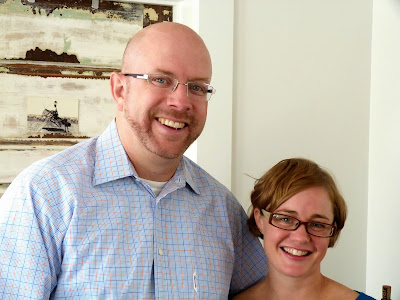Photo: JoieFarm's Michael Dinn and Heidi Noble
Heidi Noble and Michael Dinn, the owners of JoieFarm Winery,
have created a new tag to designate premium reserve wines: “En Famille.”
They explain that their definition of family includes
relatives, staff and “committed grape growers.” And the growers are credited on
the back label of the wines.
I think this is more than just good public relations. With a
very tiny vineyard of its own, JoieFarm is unusually reliant on growers.
In an interview with me last year, Michael discussed both
the advantages and disadvantages of relying on growers.
“Because we were dealing with growers, we did not have to
deal with the huge capital costs of land,” he said of the winery they launched
in 2004, literally on a shoestring. It would be hard to find another couple in
the Okanagan who started with such limited resources and levered them to such
major success.
They recognized when they started that they might have to
deal with inconsistent quality when buying grapes from many outside sources.
“There was the reason for us to be doing blended wines,”
Michael said. “It was one of the reasons we made The Noble Blend and the Rosé. Even
wines like the Chardonnay and the Riesling that were single varietals were
blended from multiple vineyards. That
was a key part of the whole equation – making sure your eggs are not all in one
basket. You have to have the ability to mitigate what a grower might do – or
not do, so to speak.”
I asked Michael: “Can growers hand you nasty surprises?”
He replied: “We don’t get them anymore because we are so
hands on. Probably there are six, seven, eight visits made each year, outside
of fruit sampling. You have to make those visits regularly or people will do
what they want.
“It is not like they are bad but self-interest overtakes in
some cases; and in other cases, they just do not know. It has to do with the
transition of the economy here from tree fruits to grapes. You are not dealing
with multi-generational viticulturists here.”
Giving growers credit on the back labels is simply part of
the good grower relations that JoieFarm cultivates. The payoff is evident in
the consistent quality of the JoieFarm wines.
Here are notes on the 2011 wines that JoieFarm released this
fall.
JoieFarm “En Famille”
2011 Reserve Chardonnay ($30 for 408 cases). This wine was a gold medal
winner at the 2013 Decanter World Wine Awards. It is an elegant wine with
aromas of citrus and quince and a delicate toasty note of lees contact. On the
palate, there are flavours of tangerine and ripe pineapple. The oak aging and
the regular lees stirring contributed to a lush and rich texture; yet the wine
still has bright and refreshing acidity. Like a good Burgundy , this cork-finished wine will age
well. Three different growers contributed to this wine. 91.
JoieFarm “En Famille”
2011 Reserve Gewurztraminer ($28 for 150 cases). In this instance, the
grapes are from the winery’s own vineyard where the vines are cropped sparing
about two tons an acre (try asking a grower to crop that low!). This wine is
intense and concentrated, with aromas of rose petals, ginger and citrus. On the
palate, there are flavours of citrus and spice, with a very long finish. The
wine is balanced to finish in the rich and dry style of an Alsace
Gewürztraminer. This won gold and best in class at the 2013 Los Angeles
International Wine Competition. 91.
JoieFarm “En Famille”
2011 Reserve Pinot Noir ($30 for 204 cases). Three vineyards contributed
grapes to this wine which actually represents the 12 best barrels in the
cellar. The winery says this is the most masculine Pinot Noir it has yet made.
It begins with earthy cherry aromas. On the palate, the cherry flavours mingle
with coffee and cola. 91.
JoieFarm 2011 Pinot Noir ($24 for 488 cases). The
other barrels in the cellars were evidently quite good as well. This was a gold
medal winner at the 2013 Northwest Wine Competition. It begins with aromas of
cherries, raspberries and spice and it echoes those on the lively palate. The
initial firm texture softened overnight to the classic silky texture of Pinot
Noir. Three vineyards contributed to this wine. 90.
JoieFarm 2011 Gamay ($24
for 530 cases). All the grapes for this came from Bryan Hardman’s Deep Roots
Vineyard. He is opening his own winery and may be keeping some of the Gamay for
himself. This is a generous wine that blows a lot of Beaujolais out of the water, with its earthy aromas of
cherry and its savoury flavours of cherry and blackberry. There is an
intriguing note of pepper on the finish. This wine, closed with a screw cap,
won a best of class gold medal at the 2013 Riverside International Wine
Competition and gold at the Northwest Wine Competition. 90.
JoieFarm 2011 PTG ($24
for 530 cases). Another winner of a best in class gold at Riverside , this wine is 50% Pinot Noir from
the Hollenbach and Albrecht vineyards and 50% Gamay from Deep Roots. It begins
with aromas of raspberry and pepper, leading to flavours of raspberry, cherry
and blackberry and savoury notes on the finish. 90.
If the term is unfamiliar, PTG is short for
“Passe-Tout-Grains.” It is a phrase that Burgundian winemakers use for blends
of Pinot Noir and Gamay.







No comments:
Post a Comment